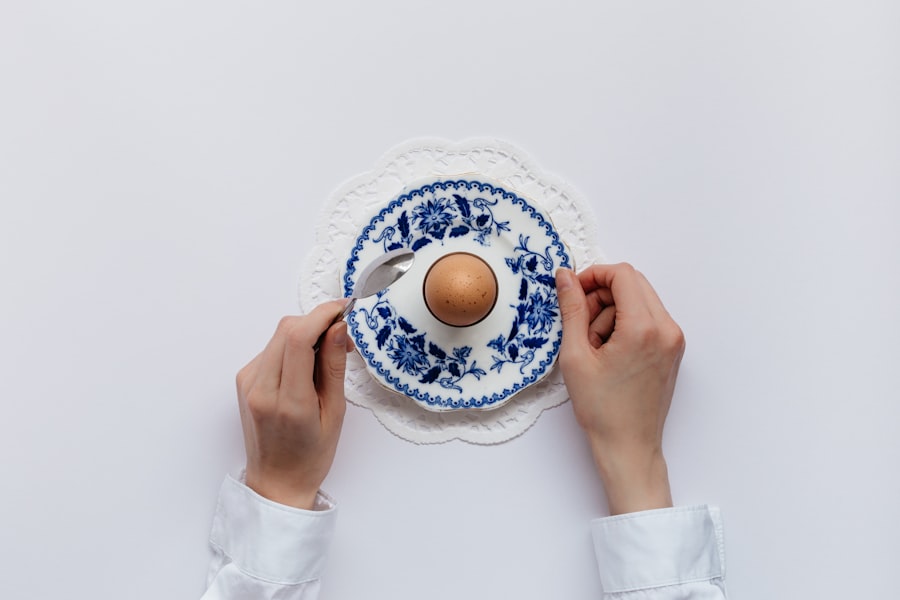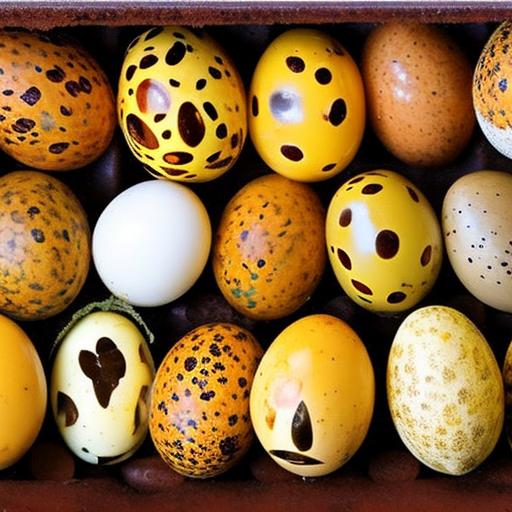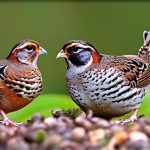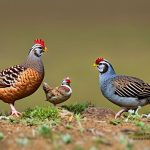Quail eggs are small, speckled eggs laid by quail birds, which are popular for their delicate flavor and high nutritional value. These eggs are a rich source of protein, vitamins, and minerals, making them a popular choice for health-conscious individuals. Quail eggs are also known for their ornamental value and are often used in gourmet cooking and as a decorative element in various dishes. Due to their small size, quail eggs are often considered a delicacy and are a popular choice for appetizers and hors d’oeuvres. They can be enjoyed boiled, fried, or pickled, and are a versatile ingredient in various cuisines around the world.
Quail eggs are also popular in the field of alternative medicine, where they are believed to have various health benefits, including improving immunity, promoting healthy skin, and aiding in digestion. In some cultures, quail eggs are also considered to have aphrodisiac properties and are used as a natural remedy for certain health conditions. With their unique flavor and nutritional benefits, quail eggs have gained popularity in recent years and are now readily available in many grocery stores and specialty food markets. Whether enjoyed as a snack, used in cooking, or for their potential health benefits, quail eggs are a versatile and valuable addition to any diet.
Key Takeaways
- Quail eggs are smaller than chicken eggs and have a higher yolk to white ratio.
- Quail eggs should be stored in a cool, dry place with the pointed end down to maintain freshness.
- Factors affecting egg viability include temperature, humidity, and egg turning frequency.
- Signs of egg viability include a visible air cell, intact shell, and no foul odor.
- The recommended incubation period for quail eggs is 17-18 days.
- Tips for successful incubation include maintaining proper temperature and humidity levels, regular egg turning, and avoiding sudden temperature fluctuations.
- In conclusion, proper storage, attention to viability factors, and adherence to recommended incubation periods are crucial for successful hatching of quail eggs.
Storing Quail Eggs
Proper storage of quail eggs is essential to maintain their freshness and viability. Quail eggs should be stored in a cool, dry place away from direct sunlight and strong odors. It is important to store quail eggs with the pointed end facing downward to help maintain the position of the yolk and air cell inside the egg. This will help to prevent the yolk from coming into contact with the air cell, which can cause the egg to spoil more quickly.
Quail eggs can be stored in the refrigerator for up to 2 weeks, but it is important to keep them in their original carton to protect them from absorbing strong odors from other foods. If you plan to store quail eggs for a longer period of time, they can be frozen for up to 3 months. To freeze quail eggs, crack them into a bowl and gently beat them to combine the yolks and whites. Then, pour the beaten eggs into an ice cube tray and freeze until solid. Once frozen, transfer the quail egg cubes to a resealable plastic bag or airtight container for long-term storage. Proper storage of quail eggs is crucial to maintaining their freshness and quality, ensuring that they can be enjoyed in various culinary applications.
Factors Affecting Egg Viability
Several factors can affect the viability of quail eggs, including the age of the eggs, the conditions in which they were laid and stored, and the health of the parent birds. The age of the quail eggs can significantly impact their viability, with fresher eggs having a higher likelihood of hatching successfully. Eggs that are older than 10 days may have a reduced hatch rate and should be used for consumption rather than incubation.
The conditions in which the quail eggs were laid and stored can also affect their viability. Eggs that have been exposed to extreme temperatures, high humidity, or strong odors may have a lower hatch rate. It is important to collect quail eggs promptly after they are laid and to store them in a clean, dry environment to maximize their viability. Additionally, the health of the parent birds can impact the quality of the eggs they produce. Quail that are well-nourished and free from disease are more likely to produce viable eggs with a higher hatch rate. By considering these factors, quail breeders can take steps to maximize the viability of their quail eggs and improve their chances of successful incubation.
Signs of Egg Viability
Determining the viability of quail eggs is essential for successful incubation. There are several signs that can indicate whether an egg is likely to hatch, including its appearance, weight, and age. A viable quail egg will have a clean and intact shell without any cracks or abnormalities. The egg should also feel heavy for its size, indicating that it has a sufficient amount of moisture inside. As quail eggs age, they lose moisture through evaporation, causing them to become lighter in weight. By weighing the eggs regularly, breeders can monitor their moisture loss and determine their viability.
Another sign of egg viability is the presence of a distinct air cell at the blunt end of the egg. This air cell forms as the egg ages and provides a space for the developing chick to breathe before hatching. A well-defined air cell is an indication that the egg is developing properly and has a higher likelihood of hatching successfully. By examining these signs, breeders can assess the viability of quail eggs and make informed decisions about which ones to incubate for hatching.
Recommended Incubation Period
The recommended incubation period for quail eggs varies depending on the species of quail and the specific conditions in which they are being incubated. In general, most quail eggs require an incubation period of 17-18 days before they are ready to hatch. However, it is important to note that different species of quail may have slightly different requirements, so it is essential to research the specific needs of the quail species you are working with.
During the incubation period, it is crucial to maintain stable temperature and humidity levels to ensure the proper development of the quail embryos. The temperature inside the incubator should be kept at around 99.5 degrees Fahrenheit, with slight variations allowed within a range of 98-100 degrees Fahrenheit. Humidity levels should be maintained at around 50-60% for the first 14 days of incubation and then increased to 65-70% during the final days before hatching. By following these guidelines and monitoring the development of the embryos, breeders can maximize their chances of a successful hatch.
Tips for Successful Incubation

Successful incubation of quail eggs requires careful attention to detail and adherence to best practices for egg handling and incubator management. To improve the chances of a successful hatch, it is essential to start with high-quality, viable eggs that have been properly stored and handled. Before placing the eggs in the incubator, it is recommended to allow them to come to room temperature for several hours to prevent condensation from forming on the eggshells.
Once the eggs are placed in the incubator, it is important to turn them regularly to ensure even heat distribution and proper development of the embryos. Quail eggs should be turned at least three times a day during the first 14 days of incubation to prevent the embryos from sticking to the inner membrane of the eggshell. It is also crucial to monitor temperature and humidity levels closely throughout the entire incubation period and make adjustments as needed to maintain optimal conditions for embryo development. By following these tips and best practices for successful incubation, breeders can increase their chances of hatching healthy quail chicks.
In conclusion, quail eggs are a valuable and versatile food source with high nutritional value and culinary appeal. Proper storage and handling of quail eggs are essential for maintaining their freshness and viability for consumption or incubation. Factors such as egg age, storage conditions, and parent bird health can impact egg viability, so it is important for breeders to take these factors into consideration when working with quail eggs.
By understanding the signs of egg viability and following recommended incubation periods and best practices for successful incubation, breeders can increase their chances of hatching healthy quail chicks. Whether enjoyed as a gourmet delicacy or used for their potential health benefits, quail eggs continue to be a popular choice for consumers around the world. With careful attention to detail and proper management, quail breeders can continue to enjoy successful hatches and contribute to the preservation and propagation of these unique and valuable birds.
If you’re wondering how long you can keep quail eggs before incubating, you might also be interested in learning about the benefits of using a SnapLock chicken coop for your poultry. SnapLock coops offer convenience and security for your chickens, making it easier to care for them and collect their eggs. To find out more about SnapLock coops and other poultry-related topics, visit PoultryWizard.com.
FAQs
How long can you keep quail eggs before incubating?
Quail eggs can be kept for up to 7-10 days before incubating, as long as they are stored properly.
What is the proper way to store quail eggs before incubating?
Quail eggs should be stored in a cool, humid environment with a temperature of around 55-60 degrees Fahrenheit and a humidity level of 70-80%.
Can quail eggs be refrigerated before incubating?
Yes, quail eggs can be refrigerated before incubating, but it is important to let them come to room temperature before placing them in the incubator.
How can you tell if quail eggs are still viable for incubation?
To check the viability of quail eggs for incubation, you can perform a process called “candling” where you shine a light through the egg to see if there is any development inside.
What factors can affect the viability of quail eggs before incubating?
Factors such as age of the eggs, storage conditions, and handling can affect the viability of quail eggs before incubating. It is important to handle them carefully and store them properly to maximize their viability.
Meet Walter, the feathered-friend fanatic of Florida! Nestled in the sunshine state, Walter struts through life with his feathered companions, clucking his way to happiness. With a coop that’s fancier than a five-star hotel, he’s the Don Juan of the chicken world. When he’s not teaching his hens to do the cha-cha, you’ll find him in a heated debate with his prized rooster, Sir Clucks-a-Lot. Walter’s poultry passion is no yolk; he’s the sunny-side-up guy you never knew you needed in your flock of friends!







